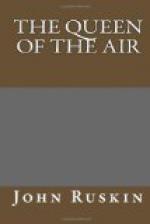88. And observe, again and again, with respect to all these divisions and powers of plants: it does not matter in the least by what concurrences of circumstance or necessity they may gradually have been developed; the concurrence of circumstance is itself the supreme and inexplicable fact. We always come at last to a formative cause, which directs the circumstance, and mode of meeting it. If you ask an ordinary botanist the reason of the form of the leaf, he will tell you that it is a “developed tubercle,” and that its ultimate form “is owing to the directions of its vascular threads.” But what directs its vascular threads? “They are seeking for something they want,” he will probably answer. What made them want that? What made them seek for it thus? Seek for it, in five fibres or in three? Seek for it, in serration, or in sweeping curves? Seek for it, in servile tendrils, or impetuous spray? Seek for it, in woolen wrinkles rough with stings, or in glossy surfaces, green with pure strength, and winterless delight?
89. There is no answer. But the sum of all is, that over the entire surface of the earth, and its waters, as influenced by the power of the air under solar light, there is developed a series of changing forms, in clouds, plants, and animals, all of which have reference in their action, or nature, to the human intelligence that perceives them; and on which, in their aspects of horror and beauty, and their qualities of good and evil, there is engraved a series of myths, or words of the forming power, which, according to the true passion and energy of the human race, they have been enabled to read into religion. And this forming power has been by all nations partly confused with the breath or air through which it acts, and partly understood as a creative wisdom, proceeding from the Supreme Deity; but entering into and inspiring all intelligences that work in harmony with Him. And whatever intellectual results may be in modern days obtained by regarding this effluence only as a motion of vibration, every formative human art hitherto, and the best states of human happiness and order, may have depended on the apprehension of its mystery (which is certain,) and of its personality, which is probable.




